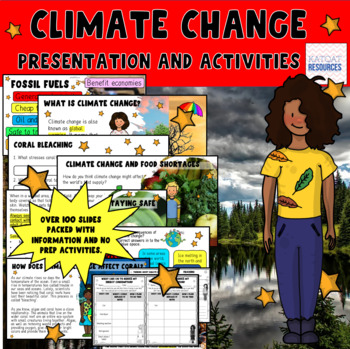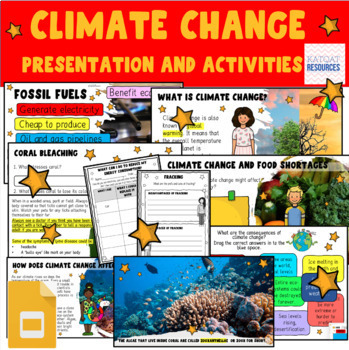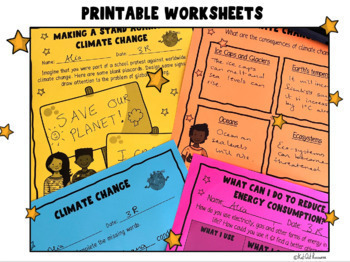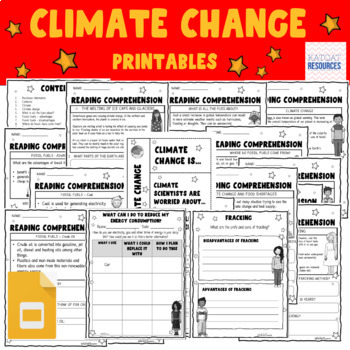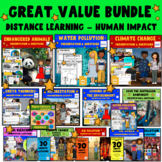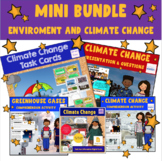Climate Change No Prep Lesson - Earth Day - PowerPoint - Distance Learning
- Zip
Also included in
- Teach your class about the environment and the effect of human impact on our planet. This bundle explores different aspects of environmental questions and issues that are raised in our classrooms. These are no-prep lessons that are colorful with straightforward explanations and examples of what eacPrice $160.00Original Price $221.50Save $61.50
- Climate Change PackClimate Change Task Cards Climate Change Task and Activity CardsPrice $40.00Original Price $54.00Save $14.00
Description
If you are teaching about environmental issues, there is a lot of information for students to process. This non-prep lesson focuses on climate change. Children will be able to learn about what plastic packaging is and the important role it plays in our environment. The slides are colorful and full of information. It's a useful addition to any unit of work about the environment. There are duplicates of some slides depending on whether you prefer to use U.S. English or British English, simply delete the slide that contains the spelling that is not applicable to you. There are opportunities for children to answer questions, both structured and unstructured, to express their views and to do some research (under the supervision of a responsible adult if they are learning from home). This is a useful resource for distance learning, whole class teaching or for instruction in small groups using a device.
⭐️⭐️⭐️⭐️⭐️⭐️⭐️⭐️⭐️⭐️⭐️⭐️⭐️⭐️⭐️⭐️⭐️⭐️⭐️⭐️⭐️⭐️⭐️⭐️⭐️⭐️⭐️
Just added - printable comprehension worksheets.
⭐️⭐️⭐️⭐️⭐️⭐️⭐️⭐️⭐️⭐️⭐️⭐️⭐️⭐️⭐️⭐️⭐️⭐️⭐️⭐️⭐️⭐️⭐️⭐️⭐️⭐️⭐️
Presentation: 110 pages
- Climate
- What is climate change?
- The consequences of climate change
- What is fossil fuel?
- Fossil fuels: gas, coal and oil
- Natural gas focus
- Coal focus
- Crude oil focus
- What do I know?
- Burning fossil fuels
- What is global warming?
- Fossil fuels
- Fracking
- The Industrial Revolution
- The cost of fracking
- The benefits of fracking
- The demand for natural gas
- Photo focus - Melting ice, extreme weather and loss of habitat
- Melting glaciers and ice caps
- Extreme weather changes and global warming
- Old sayings
- The ozone layer
- Coral and algae
- How does coral affect algae?
- Coral bleaching
- How does climate change affect children?
- Food shortages and climate change
- Ticks and climate change
- What do you use electricity for?
- Reducing climate change - what can you do?
- Climate Change Summit
- Taking action to reduce global warming
This is more practical and the focus is on knowledge and caring for our planet rather than the political aspect that may be explored later on in their school career.
Over 50 worksheet activities
- How do we use electricity?
- Help the planet
- What do I waste (doing better)
- Comprehension
- and much more!
⭐️⭐️⭐️⭐️⭐️⭐️⭐️⭐️⭐️⭐️⭐️⭐️⭐️⭐️⭐️⭐️⭐️⭐️⭐️⭐️⭐️⭐️⭐️⭐️⭐️⭐️⭐️
⭐️⭐️⭐️⭐️⭐️⭐️⭐️⭐️⭐️⭐️⭐️⭐️⭐️⭐️⭐️⭐️⭐️⭐️⭐️⭐️⭐️⭐️⭐️⭐️⭐️⭐️⭐️
If your students were interested in a particular topic raised in this Climate Change presentation, here are some resources that look deeper into topics. Just click on the green title.

